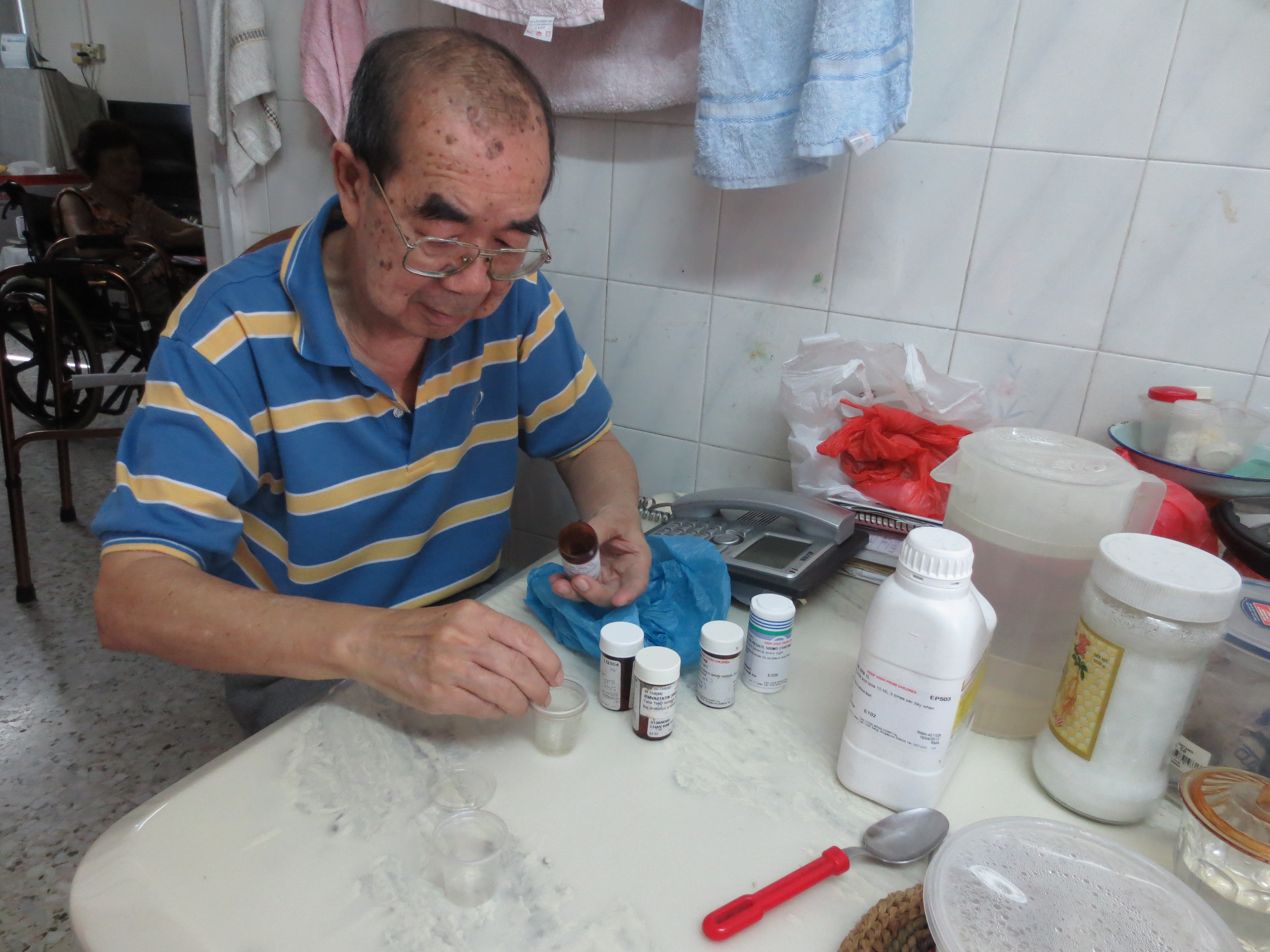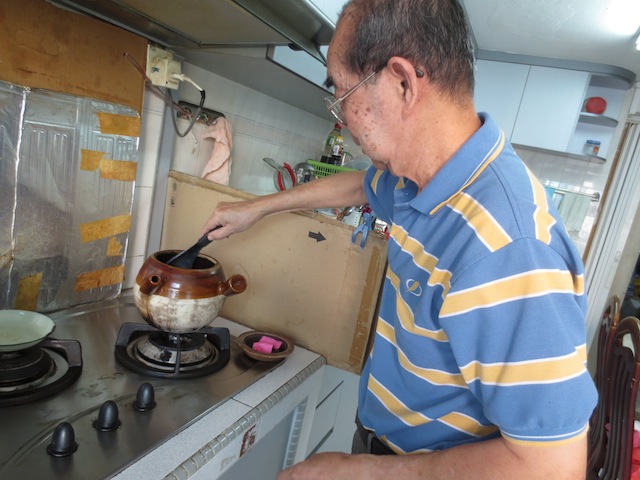For better … or worse
Marriage is not just about the good times, it is also about the times in need when the other half’s health is affected. For 74-year-old Saek Choong, he had to suddenly take on the caregiving role for his wife.
BY: Law Kim Hwee
Seventy-four-year-old Chooi Saek Choong met his wife in school in Perak, where they both hailed from, in 1956. After a courtship that lasted nine years, they got married and came to Singapore in 1957. She took on the role of the dutiful wife, caring for their son and the household, while he worked at CPF, including a stint as a personal assistant to the general manager.
However, in 2009, his life took a different turn – his wife, who is the same age as him, suffered a sudden stroke, leaving her paralysed on the left and with speech affected, and he was catapulted into a new role – caregiving for her.
Ageless Online speaks to Saek Choong about his caregiving experience:
Can you share how her life was before she had a stroke?
While I was relatively active in games and outdoor activities in my younger days, my wife was less inclined. Other than her role as a housewife and mother, some socialising with neighbours, I can’t say that she is an active person. However, she always took good care of her diet, favouring fish and green vegetables over meat. Notwithstanding that, she has had high cholesterol.
Can you recall any events or symptoms that led up to her suffering a stroke?
There were no obvious signs or indications of any impending health troubles in the time leading up to her stroke. Neither were there any periods or events of exceptional stress. It just happened suddenly.
How was her condition after the stroke and currently?
She was almost totally immobile in the first few months. That was the toughest time that I went through. I had to be around her 24/7 when she came home from the hospital initially – feeding, cleaning and clothing her.
Unfortunately, sometimes in life, a problem comes with its own companions. She currently also suffers from the occasional bout of epilepsy and a diagnosis of minor personality disorder. Nothing very serious but nonetheless causes for additional concerns.
Could you share more about how the doctors or hospital played a role in her recovery?
Frankly, as an untrained caregiver initially, there wasn’t much I could do. What really helped was the care and assistance given by the doctors and nurses who know their roles and what a stroke patient needs at all times.
After getting through the initial critical dangers at Tan Tock Seng Hospital, my wife was admitted to St Luke’s Hospital, a community hospital for therapy. Here again, it was the professionals and their dedication that made all the difference. After a month, she recovered most of her motor skills, albeit at a much reduced level.
I took the intervening time to read up voraciously in order to better understand her condition, post-recovery and how I could play my role to care for her as best I can.
I am happy to say that she is able to move on her own now with the assistance of a two-hand metal walker attached with wheels. Currently, she cannot move her left leg at will.
Were there any physical changes to your four-room flat which I understand you have been staying since 1977? Any other changes?
None at all. Other than the wheelchair at the initial stage, I made no physical change to our flat. I did, however, invest in a stationary exercise bicycle for her to get in some physical exertion so she can keep relatively fit. It’s a practical move. Otherwise, shuttling between a gym and home is both time-consuming and costly. Besides, she likes it better to work out in the comfort of her own familiar surroundings.
Her diet has changed somewhat. Now, it’s mainly oats and bread with jam for breakfast. Lunch is conveniently taken care of with packet lunches from the nearby hawker centre. For dinner, we subscribe to Meals-on-Wheels. On Saturdays and Sundays, we treat ourselves to dinner at either a cher char stall or whatever strikes our fancy.
Does your wife interact with you or anyone else?
My wife doesn’t have a gregarious nature. Most stroke victims tend to suffer from some speech impairment, which renders them less inclined to converse. Hence, she tends to keep herself occupied with what’s on TV. She also finds much comfort in chanting quietly on her own, seeking some solace in Buddhism.

Saek Choong believes in accepting everything that comes his way, including the bad and in between, as part of life.
How do you feel about your caregiving role?
I see everything in life as part of a lifecycle, part of whatever makes up our cosmos. There’s no question of ‘why should this happen to me, to us?”
I accept, or try to accept, everything that comes my way – the good, the bad and everything in between – as part of life. It happens and I try to make the best of it. For that reason, I am able to do whatever is necessary to fulfil what is expected of me – including playing the role of a caregiver. It’s not something that I had planned for. But finding myself in such a situation, I just go ahead to learn more of what the role requires and do my best for my wife.
How do you find time for yourself and to cope with the various challenges?
Ahh, I hope I do not sound like a superman! Yes, it can be demanding if not downright stressful at times, especially during the initial stages.
Fortunately for me, I have always enjoyed reading. Do you know that I can polish through as many as 30 books in a year?! Since I retired 11 years ago from working at CPF, I have frequented the library. I read up on subjects related to investments, management, self-improvement and medical/health.
Through studiously understanding investment concepts and applying what is comfortable for my own risk appetites and investment objectives, I have been able to survive with some additional passive income to supplement my CPF and personal savings. It’s modest but money is not an issue for us, happily so.
Can you share what other modes of support you get in your role as a caregiver?
Well, other than finding diversion and release in books and following the investment market reports and news, I also realise that it wasn’t enough. We are human beings. We can, but it is not wise to stick to and live only by ourselves. We need the connection with the world. And, I should also add that, perhaps, the world at large can benefit with what I can share of what I know and been through.
For that reason, when I learned of the Caregiving Welfare Association (CWA) at Ghim Moh, I was interested to join in its Caregiver Support Group, which was started in July 2013. For a mere one-time S$5 registration fee, I get to attend once-monthly sessions lasting one-and-a-half hours where a trained counsellor or nurse would facilitate the sharing and interactions amongst attendees. Each session is a great learning experience and each of us walks away with new insights as well as achieving some form of mental and emotional release. We are sometimes treated to talks and programme on health and wellness issues.
Any advice for other caregivers?
I think that first and foremost, one has to start with a positive mental attitude. It’s easier said than done, right? Some of us will find that less difficult because that is the way that we have lived through our lives or approach life before something negative and unexpected struck us. But some, maybe most, live through life mostly cruising nicely – until we hit the wall! Then, bang and ouch! We are dazed.
Well, I believe what helps is just to look at the situation like this: How will the given situation be helped if I take it negatively? Nothing whatsoever! So, start with being positive. Or, in practical terms, make the best of it. From there on, bit by bit, step by step you would see progress, as it was with my case as my wife has recovered slowly but surely.
In the meantime, when most things in one’s life go rather smoothly, it is important to studiously, if not religiously, set aside some savings for that raining day. How to do it when one’s commitments are also crying out to be met? Well, in the first place, start by living within your means. Buy less, opt for a smaller flat, less central location, etc. Also, why work long hours just to pay bills but with no time to enjoy your possessions?
And, yes, my favourite topic – invest in something that will yield some passive income while you are still gainfully employed or when there is no recurring income. Every little bit will add up, especially over a longer time period.
Finally, through all the need to give care, don’t forget to take care of yourself.


0 Comments